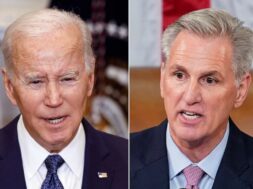
Debt-ceiling: As the House nods, no US default for now; Bill sent to the Senate
Virendra Pandit
New Delhi: Ahead of the June 5 default deadline, the US Congress’ Lower House (House of Representatives) on Wednesday passed the debt-limit legislation forged by President Joe Biden and Speaker Kevin McCarthy that would impose restraints on government spending through the 2024 election and sent it to the Upper House (Senate) for final approval.
In a rare bonhomie, the US lawmakers from both parties—the ruling Democratic and the Opposition Republican—approved the Fiscal Responsibility Bill with a majority of 314-117 on Wednesday evening, sending the measure to the Senate to approve it as an Act, as a default deadline draws near.
The vote cements President Biden’s reputation for pragmatism and working across party lines as he seeks a second term next year. It also allows McCarthy to claim success in his first major test as Speaker, the media reported on Friday.
The Biden-McCarthy agreement won the backing of two-thirds of House Republicans, an important show of confidence for the Speaker, whose narrow majority in the Grand Old Party (GOP), the Republicans, leaves him vulnerable to challenges from discontented members.
The outcome marked a rare moment of bipartisan accord in a bitterly divided Washington—and even in the Republican Party where former President Donald Trump still calls some shots.
President Biden called the House vote “good news for the American people and the American economy.”
The last month’s uncertainties had worried many about a possible default if the two parties did not reach an agreement, and its fallout on world economies.
Some investors guessed the danger of a US default and looked to other uncertainties which could influence growth, such as another possible Federal Reserve interest-rate hike and signs of a weakening Chinese economy.
The debt-ceiling bill would remove the threat of another default crisis for the remainder of Biden’s current term, suspending the debt limit until January 1, 2025. As a quid pro quo, his Democrats agreed to cap federal spending into 2025, likely forcing some retrenchment in government services given the current 5 percent annual inflation rate.
The ball is now in the Senate, where approval is virtually certain. John Thune, the Senate’s No. 2 Republican, said earlier Wednesday it could be passed on Friday night, days ahead of the June 5 default deadline.
During the House debate, both parties claimed victory. McCarthy called the legislation “a step toward smaller government.” House Democratic leader Hakeem Jeffries said his party “stopped extreme MAGA Republicans from crashing the economy.”
Spending restraints in the deal may impact individuals, particularly young college graduates who must resume student loan payments and some lower-income Americans hit with benefit restrictions or service cuts.
But Morgan Stanley economists said the entire package will have a “negligible impact” on the overall US economy, which may dampen growth next year by a couple of tenths of a percentage point.
The hard choices on how to adjust government services are mostly left to the US Congress to negotiate in separate spending packages due before the October 1 start of the next federal fiscal year.
The Congressional Budget Office projects the spending caps will require USD 64 billion in cuts next year, although White House officials claim they have another deal to counteract most of those cuts, effectively amounting to an overall spending freeze.
Still, the Democratic-Republican deal marks a turning point toward reining in government spending after years of record-breaking Covid-related bailouts and two signature Biden initiatives unleashing large government investments in infrastructure and combating climate change.
Hard-line conservatives denounced the compromise for falling short of Republican demands for deeper spending cuts and more stringent work requirements for food assistance recipients and other anti-poverty aid recipients.
But ultra-conservatives are angry over the concessions, which poses a serious risk to McCarthy since he could be fired by even a small group of Republicans because of his party’s narrow majority in the Lower House. Republican Representative Dan Bishop said on Tuesday he would call for a vote to remove the Speaker.
Democratic progressives also were peeved over the agreement’s spending cuts, provisions expediting permitting for energy projects, and expanded work requirements for federal food stamps.













